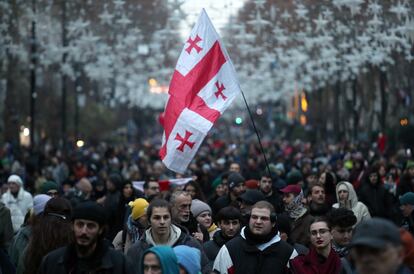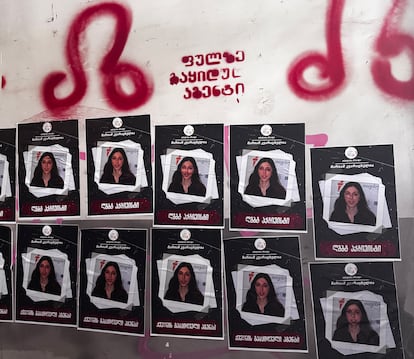Georgia’s LGBTQ+ community under threat: The end of the Caucasus’ capital of freedom
The ultraconservative shift of the ruling party in Tbilisi, mirroring the paths taken by Russia and Hungary, has intensified pressure on the country’s gay and lesbian population, which now faces increased attacks, violence, and repression


The murder of Kesaria Abramidze was a devastating blow to Georgia’s LGBTQ+ community. On September 18, the transgender model and presenter was stabbed multiple times. Neighbors discovered her lifeless body in a pool of blood. The confessed perpetrator, her 26-year-old ex-partner, was arrested and faces up to 20 years in prison. According to posts the victim shared on social media a few months prior, their relationship had been “toxic.”
Abramidze was one of the most prominent public figures in the country, yet even her fame could not shield her from this tragic fate. Reports from local media suggest that her complaints to the authorities may have gone ignored. Activists and the LGBTQ+ community in Georgia are now left grappling with a sobering question: if someone as visible as Kesaria could not be protected, how can the rest of the community survive amid the rising tide of hatred sweeping the nation?
Just 24 hours before this brutal crime, the Georgian Parliament approved the “Law on Family Values and Protection of Minors,” a Draconian measure that bans any public expression deemed to be “LGBTQ+ propaganda.” The Social Justice Center in Tbilisi condemned the legislation, stating: “Political homophobia, biphobia, and transphobia have become central to the government’s official discourse and ideology. Kesaria Abramidze’s killing cannot be viewed separately from this overall grave context.”
While Georgian society is largely conservative, progressive legislation enacted over the past two decades had allowed civil society to flourish. Numerous rights and advocacy groups emerged, establishing a foothold in the nation. Tbilisi, in turn, became the region’s liberal capital — a hub for peace activists from Armenia and Azerbaijan, a haven for exiles fleeing neighboring autocracies, and a rare safe space for lesbian, gay, bisexual, and transgender people.
“Even though it was slow, there was progress. We organized festivals, conferences. State policies were updated, and mentions of sexual diversity were added. We worked on training police officers,” recalls Mariami Kvaratskhelia, co-founder of Tbilisi Pride and leader of the activist group Queer Initiative. “LGBTQ+ people from Iran, Lebanon, Armenia, Azerbaijan, Chechnya… came to live here because they felt freer, safer.”
That sense of safety has vanished. In recent years, hundreds of LGBTQ+ individuals have fled Georgia, and many more are expected to follow if the ruling Georgian Dream party holds on to power. The group was declared the winner of the October 26 election, but the opposition has refused to recognize the result, claiming there was widespread fraud.
The Georgian Dream party, led by oligarch Bidzina Ivanishvili, has adopted an ultra-conservative agenda modeled after Russia and Hungary, targeting individuals who deviate from heteronormative standards. “In 2021, slightly more progressive politicians and leaders abandoned Georgian Dream, and we witnessed a shift toward right-wing policies. By 2023, they had become genuinely radical,” explains Kvaratskhelia.
The reasons behind this shift vary depending on who you ask. Some point to the government’s closer ties with Vladimir Putin’s Russia; others highlight the need to maintain favor with the influential Georgian Orthodox Church. According to Kvaratskhelia, it’s also about reframing public discourse to introduce new narratives that help the party cling to power.
The result has been a relentless focus on the supposed need to protect families and children from “harmful LGBTQ+ propaganda.” “Mentions of our community were removed from all public policy documents, our events were banned, and the police stopped protecting us,” says Kvaratskhelia.
LGBTQ activists in Tbilisi say mobs had attacked their office, forcing them to cancel Georgia's first Pride march 🏳️🌈🇬🇪 pic.twitter.com/Bjiggr6a3q
— DW News (@dwnews) July 5, 2021
In 2021, Tbilisi Pride and other organizations planned a Pride march along Rustaveli Avenue, the city’s central thoroughfare. However, the event was violently disrupted by militants from Alt-Info, a far-right channel turned political party accused of being funding from Russia. Anna Tavadze, a queer activist and member of the Shame movement — one of the event’s organizers — recalled the chaos: “It was horrible, brutal. They started attacking journalists — more than 30 were injured. They chased activists back and forth and eventually attacked the offices of Shame and Tbilisi Pride. The police did nothing to stop them.”
Rather than condemning the violence, then-prime minister Irakli Garibashvili declared that the Pride march itself was “unacceptable to most of society.” As a result, the following year’s Pride event was relocated to a remote area of the city and held under heavy security measures.
In 2023, activists attempted to replicate the 2022 festival, even inviting foreign diplomats as a precautionary security measure. But, militants from Alt-Info returned, vandalizing stages and setting fire to equipment. “The police let the counter-demonstrators get so close that suddenly they started throwing bottles and stones at us,” recounts Anna Tavadze. “I thought to myself, if I don’t escape, they’ll kill me. The police then started shouting for us to evacuate, and it became clear that this was a plan to allow Alt-Info to attack the festival.” None of the perpetrators have been brought to trial, she adds, which sends the message that attacking queer people comes with no consequences.
This year, activists’ homes have also been targeted. Among those attacked was Kvaratskhelia’s. In May, her building’s door and floors were plastered with posters displaying her face and name, labeling her as an “LGBTQ+ activist” and a “foreign agent who’d sold out.” “In addition, my girlfriend and I have been subjected to relentless online harassment campaigns,” she says. “My father, who is battling cancer, has also received multiple intimidating calls demanding he stop me from continuing my activities.”

Fear and exile
In 2023, the Georgian Dream party was invited to CPAC, the annual conference organized by American ultra-conservative movements, in Budapest. There, it aligned itself with the global “anti-gender ideology” movement, which led to its expulsion from the Party of European Socialists. Upon their return, Georgian politicians adopted increasingly inflammatory rhetoric. During the last election campaign, Bidzina Ivanishvili absurdly claimed that in the West, minors are forced to participate in orgies during Pride marches and that “they want to equate men’s and women’s milk.”
Nikoloz Samkharadze, an MP from the ruling party, defends the new “family values” law, claiming it is not anti-LGBTQ+ but aims to “protect minors” and prevent “gender issues” from being taught in schools — though such teachings were never part of Georgia’s curriculum. In reality, the law, which came into force in December, bans any public event or media content that could be perceived as “propaganda” in favor of the LGBTQ+ community or that portrays homosexuality in a “positive” light. May 17, recognized as the International Day Against Homophobia, Transphobia and Biphobia, has been rebranded in Georgia as the “Day of the Sanctity of the Family and Respect for Parents.”
The law goes further, outlawing any gender-affirming medical interventions, including hormonal treatments, with prison sentences for doctors who perform them. The United Nations High Commissioner for Human Rights has called for the law’s withdrawal, stating that it violates the rights “to equality, non-discrimination, education, health, freedom of expression, peaceful assembly and association, as well as privacy, liberty and security.”
Tavadze highlights that the law follows the “foreign agents” law passed in the spring, which targets organizations that receive donations from abroad. This will jeopardize NGOs that provide critical services to the LGBTQ+ community, including health care, psychosocial support, and the documentation of hate crimes. “For our community, NGOs have been the only source of essential services,” she says. The activist believes the legislation’s true aim is to render LGBTQ+ people invisible once again, forcing them back “underground.”
“Everyone is afraid, and that’s why they’re leaving,” laments Kvaratskhelia. “Even activists and people working in NGOs are fleeing. They’re going to Belgium, Germany, the Netherlands, the United States... I know this because I receive their messages every day.” Still, she adds: “There are others of us who stay, and we will continue to fight.”
Sign up for our weekly newsletter to get more English-language news coverage from EL PAÍS USA Edition
Tu suscripción se está usando en otro dispositivo
¿Quieres añadir otro usuario a tu suscripción?
Si continúas leyendo en este dispositivo, no se podrá leer en el otro.
FlechaTu suscripción se está usando en otro dispositivo y solo puedes acceder a EL PAÍS desde un dispositivo a la vez.
Si quieres compartir tu cuenta, cambia tu suscripción a la modalidad Premium, así podrás añadir otro usuario. Cada uno accederá con su propia cuenta de email, lo que os permitirá personalizar vuestra experiencia en EL PAÍS.
¿Tienes una suscripción de empresa? Accede aquí para contratar más cuentas.
En el caso de no saber quién está usando tu cuenta, te recomendamos cambiar tu contraseña aquí.
Si decides continuar compartiendo tu cuenta, este mensaje se mostrará en tu dispositivo y en el de la otra persona que está usando tu cuenta de forma indefinida, afectando a tu experiencia de lectura. Puedes consultar aquí los términos y condiciones de la suscripción digital.








































